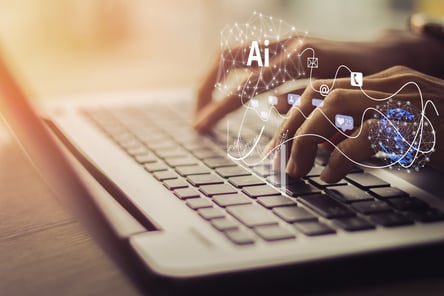Artificial intelligence (AI) has been a rapidly growing field in recent years, with the potential to transform industries and society. However, as AI technology advances, it is essential to consider the ethical implications of its development and implementation.
Ethical considerations around AI
As artificial intelligence (AI) becomes more ubiquitous in our society, it is essential to consider the ethical implications of its development and implementation. One of the main ethical concerns surrounding AI is bias. AI algorithms are only as unbiased as the data they are trained on, which can perpetuate existing biases and inequalities. Privacy is another ethical consideration, as the use of AI often involves the collection and processing of personal data. Finally, there is the potential for AI to displace workers, which raises concerns about job security and economic inequality. These ethical considerations must be taken seriously and addressed by industry experts, policymakers, and the public to ensure that AI is developed and implemented responsibly and ethically.

Case studies and examples of AI-related ethical dilemmas
Facial recognition technology is one of the most prominent examples of an AI-related ethical dilemma. This technology uses algorithms to identify individuals based on their facial features, which raises concerns about privacy and bias. Several case studies have highlighted the potential dangers of facial recognition technology, such as the following examples:
- In 2019, the American Civil Liberties Union (ACLU) conducted a study that showed that Amazon's facial recognition technology incorrectly identified 28 members of Congress as criminals. This incident highlights the potential for facial recognition technology to perpetuate biases and inaccuracies.
- In 2020, Detroit police wrongfully arrested Robert Williams, an innocent Black man, based on a facial recognition algorithm's incorrect identification. This case highlights the potential for facial recognition technology to perpetuate racial biases and contribute to wrongful arrests and convictions.
- In 2021, a study by the National Institute of Standards and Technology (NIST) found that facial recognition algorithms were less accurate in identifying individuals with darker skin tones and women, highlighting the potential for biases in these technologies.
These case studies highlight the ethical dilemmas associated with facial recognition technology and the need for regulation and oversight to ensure its responsible and ethical use. As AI technology continues to advance, it is crucial to consider the potential ethical implications of its use and to work to mitigate any potential negative impacts on society.
Here are a few perspectives and opinions from industry experts, academics, and policymakers on the ethical implications of AI:
"The development of full artificial intelligence could spell the end of the human race... It would take off on its own and re-design itself at an ever-increasing rate. Humans, who are limited by slow biological evolution, couldn't compete, and would be superseded." - Stephen Hawking, renowned physicist (source: BBC News) https://www.bbc.com/news/technology-30290540
"AI is a powerful tool but not a magic wand. It can amplify human abilities, but it can also amplify human biases if we're not careful." - Timnit Gebru, Former Co-Lead of Google's Ethical AI Team (source: The Verge) https://www.theverge.com/2018/6/22/17492552/timnit-gebru-google-ai-ethics-research
"AI is only as unbiased as the data it's trained on. To build truly ethical and unbiased AI, we must ensure that our data sets are representative of the diverse world we live in." - Joy Buolamwini, Founder of the Algorithmic Justice League (source: Forbes) https://www.forbes.com/sites/forbestechcouncil/2018/12/19/why-ethical-ai-is-critical-to-the-future-of-our-world/?sh=5b748c0e3997
"AI technologies can provide tremendous benefits, but we must also address their potential risks, including those related to privacy, bias, and job displacement." - Ginni Rometty, Executive Chairman of IBM (source: IBM) https://www.ibm.com/blogs/think/2019/03/ginni-rometty-ai-ethics/
These perspectives and opinions highlight AI technology's potential benefits and risks and the importance of ethical considerations in its development and deployment. By considering these perspectives, we can work to ensure that AI is used to benefit society as a whole responsibly and ethically.

Positive Ethical Examples of AI Innovation in Real-World Applications
While there have been concerns about the potential negative impacts of AI, there are also many examples of positive outcomes resulting from ethical and responsible AI innovation. AI can be used for the benefit of society while maintaining ethical standards. These case studies illustrate the importance of prioritizing ethical considerations, building diverse teams, and investing in education and awareness to ensure that AI is used for the greater good.
- AI-powered medical diagnosis: AI technology is increasingly being used in the healthcare industry to help doctors make more accurate diagnoses. For example, the company IDx has developed an AI system that can detect diabetic retinopathy, a condition that can lead to blindness, with a high level of accuracy. This technology has the potential to save lives and improve the quality of life for people with diabetes.
- AI-powered environmental monitoring: The use of AI in environmental monitoring can help to protect the planet and promote sustainability. For example, the company PlanetWatchers uses AI to analyze satellite data and detect illegal deforestation, which can help to prevent further damage to the world's forests.
- AI-powered financial inclusion: AI technology can also be used to promote financial inclusion, especially in developing countries where many people do not have access to traditional banking services. For example, the Kenyan mobile money platform M-Pesa uses AI to analyze customer data and provide loans to users who would not otherwise qualify for traditional banking loans. This technology has helped to promote economic growth and reduce poverty in Kenya and other countries where it has been adopted.
Strategies and Best Practices for balancing innovation
The development and deployment of AI have the potential to transform our society, but it also comes with ethical and social responsibilities. Therefore, it is crucial to find a balance between innovation and responsibility to ensure that AI is used ethically and benefits society as a whole. Some strategies and best practices for achieving this balance include:
Prioritizing ethical considerations: One effective strategy to achieve this balance is to prioritize ethical considerations. Ethical considerations should be at the forefront of any AI development and deployment process, and potential impacts of AI on society should be evaluated to mitigate any possible adverse effects. This can be achieved through ethical principles such as transparency, accountability, and privacy.
Building diverse teams: Building diverse teams that include individuals with different backgrounds, experiences, and perspectives can help to mitigate biases and ensure that AI technology is developed and deployed ethically and responsibly. Diverse teams can also bring new ideas and perspectives that can lead to more innovative solutions.
Investing in education and awareness: Investing in education and awareness about AI is also crucial in achieving the balance between innovation and responsibility. This can help the public and policymakers better understand the potential benefits and risks of this technology. Moreover, education can also help in debunking common myths and misconceptions about AI that can cause fear and skepticism.
Establishing standards and regulations: Establishing standards and regulations for AI development and deployment can ensure that this technology is used responsibly and ethically. Standards can help ensure that AI systems are designed and developed with ethical principles in mind, and regulations can help prevent any negative impact of AI on society.

By prioritizing ethical considerations, building diverse teams, investing in education and awareness, and establishing standards and regulations, we can work towards balancing innovation and responsibility in the development and deployment of AI, ensuring that this technology is used to benefit society as a whole.
As the use of artificial intelligence continues to grow, it's essential to consider the ethical implications of AI development and implementation. Join the conversation and share your perspective on balancing innovation and responsibility in using AI. Contact us at: https://alliedits.com/ to learn more about our AI ethics research and initiatives.